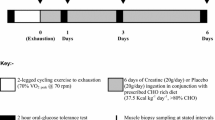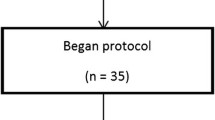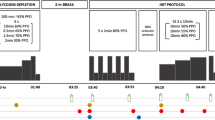Abstract
The benefits of dietary creatine supplementation on muscle performance are generally related to an increase in muscle phosphocreatine content. However, creatine supplementation may benefit endurance sports through increased glycogen re-synthesis following exercise. This study investigated the effect of creatine supplementation on muscle glycogen content, submaximal exercise fuel utilisation and endurance performance following 4 weeks of endurance training. Thirteen healthy, physically active, non-vegetarian subjects volunteered to take part and completed the study. Subjects were supplemented with either creatine monohydrate (CREAT, n = 7) or placebo-maltodextrin (CON, n = 6). Submaximal fuel utilisation and endurance performance were assessed before and after a 4 week endurance training program. Muscle biopsies were also collected before and following training for assessment of muscle creatine and glycogen content. Training increased quadriceps glycogen content to the same degree (∼20%) in both groups (P = 0.04). There was a significant training effect on submaximal fuel utilisation and improved endurance performance. However, there was no significant treatment effect of creatine supplementation. Creatine supplementation does not effect metabolic adaptations to endurance training.


Similar content being viewed by others
References
Balsom PD, Harridge SD, Soderlund K, Sjodin B, Ekblom B (1993) Creatine supplementation per se does not enhance endurance exercise performance. Acta Physiol Scand 149:521–523
Bergstrom J, Hermansen L, Hultman E, Saltin B (1967) Diet, muscle glycogen and physical performance. Acta Physiol Scand 71:140–150
Booth JM, McKenna MJ, Ruell P, Gwinn T, Davis GM, Thompson MW, Harmer AR, Hunter SK, Sutton JR (1997) Impaired calcium pump function doers not slow relaxation in human skeletal muscle after prolonged exercise. J Appl Physiol 83:511–521
Conlee RK (1987) Muscle glycogen and exercise endurance: a twenty-year perspective. Exerc Sports Sci Rev 15:1–28
Derave W, Eijnde BO, Verbessem P, Ramaekers M, Van Leemputte M, Richter EA, Hespel P (2003) Combined creatine and protein supplementation in conjunction with resistance training promotes muscle GLUT-4 content and glucose tolerance in humans. J App Physiol 94:1910–1916
Engelhardt M, Neumann G, Berbalk A, Reuter I (1998) Creatine supplementation in endurance sports. Med Sci Sports Exerc 30:1123–1129
Evans WJ, Phinney SD, Young VR (1982) Suction applied to a muscle biopsy maximizes sample size. Med Sci Sports Exerc 14:101–102
Greenhaff PL, Casey A, Short AH, Harris R, Soderlund K, Hultman E (1993) Influence of oral creatine supplementation of muscle torque during repeated bouts of maximal voluntary exercise in man. Clin Sci 84:565–571
Harris RC, Soderlund K, Hultman E (1992) Elevation of creatine in resting and exercised muscle of normal subjects by creatine supplementation. Clin Sci 83:367–374
Hawley JA, Schabort EJ, Noakes TD, Dennis SC (1997) Carbohydrate-loading and exercise performance. An update Sports Med 24:73–81
Holloszy JO, Booth FW (1976) Biochemical adaptations to endurance exercise in muscle. Ann Rev Physiol 38:273–291
Izquierdo M, Ibanez J, Gonzalez-Badillo JJ, Gorostiaga EM (2002) Effects of creatine supplementation on muscle power, endurance, and sprint performance. Med Sci Sports Exerc 34:332–343
Lukasi HC (1987) Methods for the assessment of human body composition: traditional and new. J Clin Nutr 46:537–556
Nelson AG, Arnall DA, Kokkonen J, Day R, Evans J (2001) Muscle glycogen supercompensation is enhanced by prior creatine supplementation. Med Sci Sports Exerc 33:1096–1100
Newman JE, Hargreaves M, Garnham A, Snow RJ (2003) Effect of creatine ingestion on glucose tolerance and insulin sensitivity in men. Med Sci Sports Exerc 35:69–74
Op ‘t Eijnde B, Richter EA, Henquin JC, Kiens B, Hespel P (2001a) Effect of creatine supplementation on creatine and glycogen content in rat skeletal muscle. Acta Physiol Scand 171:169–176
Op ‘t Eijnde B, Urso B, Richter EA, Greenhaff PL, Hespel P (2001b) Effect of oral creatine supplementation on human muscle glut4 protein content after immobilization. Diabetes 50:18–23
Peronnet F, Massicotte D (1991) Table of nonprotein respiratory quotient: an update. Can J Sport Sci 16:271–279
Powers ME, Arnold BL, Weltman AL, Perrin DH, Mistry D, Kahler DM, Kraemer W, Volek J (2003) Creatine supplementation increases total body water without altering fluid distribution. J Athl Train 38:44–50
Robinson TM, Sewell DA, Hultman E, Greenhaff PL (1999) Role of submaximal exercise in promoting creatine and glycogen accumulation in human skeletal muscle. J Appl Physiol 87:598–604
Terjung RL, Clarkson P, Eichner ER, Greenhaff PL, Hespel PJ, Israel RG, Kraemer WJ, Meyer RA, Spriet LL, Tarnopolsky MA, Wagenmakers AJ, Williams MH (2000) American college of sports medicine roundtable. The physiological and health effects of oral creatine supplementation. Med Sci Sports Exerc 32:706–717
Van Loon LJ, Oosterlaar AM, Hartgens F, Hesselink MKC, Snow RJ, Wagenmakers AJM (2003) Effects of creatine loading and prolonged creatine supplementation on body composition, fuel selection, sprint and endurance performance in humans. Clin Sci 104:153–162
Van Loon LJ, Murphy R, Oosterlaar AM, Cameron-Smith D, Hargreaves M, Wagenmakers AJM, Snow R (2004) Creatine supplementation increases glycogen storage but not GLUT-4 expression in human skeletal muscle. Clin Sci 106:99–106
Acknowledgments
The authors would like to thank Musashi Pty. Ltd. for the generous donation of Creatine Monohydrate. We would also like to thank Manildra Starches Pty. Ltd. for the generous donation of Maltodextrin.
Author information
Authors and Affiliations
Corresponding author
Rights and permissions
About this article
Cite this article
Reardon, T.F., Ruell, P.A., Fiatarone Singh, M.A. et al. Creatine supplementation does not enhance submaximal aerobic training adaptations in healthy young men and women. Eur J Appl Physiol 98, 234–241 (2006). https://doi.org/10.1007/s00421-006-0267-9
Accepted:
Published:
Issue Date:
DOI: https://doi.org/10.1007/s00421-006-0267-9




